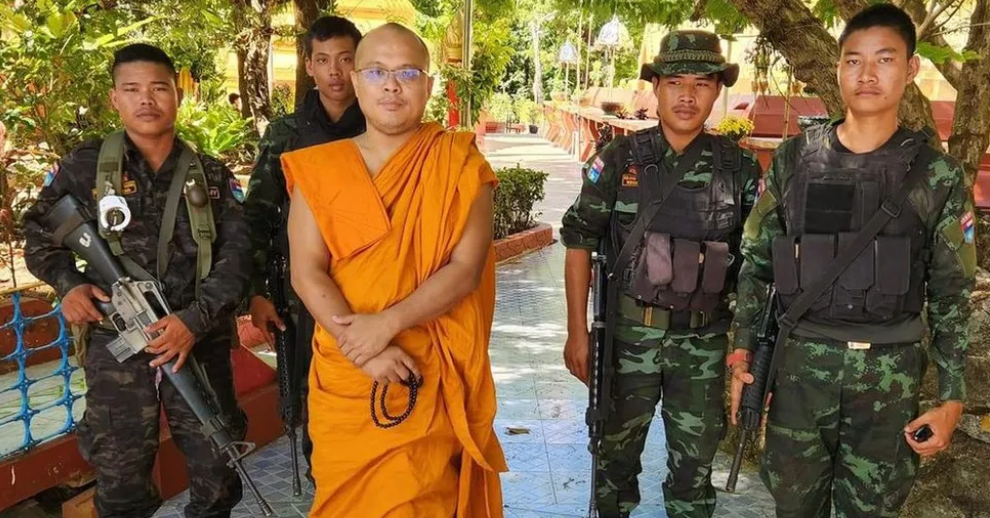As defeats mount, Buddhist extremists start to desert Myanmar’s military regime
Monk Pauk Ko Taw, who until now had supported the regime’s strongman, General Min Aung Hlaing, publicly criticised him calling for his deputy to step in his place. Morale among the troops is very low, and some commanders who surrendered have been sentenced to death. The fall of another major city could start a new phase in the civil war (or lead to its resolution).
Yangon (AsiaNews/Agencies) – The military junta that seized power in Myanmar on 1 February 2021 in a coup d'état, sparking a civil war, is increasingly on the ropes.
Pro-military monks from the country’s ultranationalist fringe have come out against junta strongman General Min Aung Hlaing, calling for his replacement following recent defeats suffered at the hands of resistance forces, particularly in Shan State.
From a small stage in Pyin Oo Lwin, a city in the Mandalay region, monk Pauk Ko Taw suggested last week that Min Aung Hlaing's deputy, General Soe Win, should take over.
"Look at Soe Win's face," Pauk Ko Taw said to the crowd. "That's the face of a real soldier. Min Aung Hlaing is not coping. He should move to a civilian role."
On 4 January, about 2,400 regular soldiers, including more than 200 officers, surrendered to the Myanmar National Democratic Alliance Army (MNDAA), allowing ethnic militias of the Three Brotherhood Alliance to capture the city of Laukkai and other areas in the Kokang region, on the border with China.
As a result, three brigadier generals were sentenced to death for "shamefully abandoning" their posts, while three others were given life in prison, sources within the junta revealed.
Troops from other units that clashed with the Kachin Independence Army (KIA), one of Myanmar's historic ethnic militias, fled to China, only to be handed back to Myanmar a few days later.
According to Indian authorities, about 700 Myanmar soldiers have crossed the border into Chin State in the last month after suffering heavy losses to anti-coup armed militias.
It is also significant that Pauk Ko Taw gave his speech in Pyin Oo Lwin, because this is home to the Defence Services Academy, a prestigious school where the army’s top officers are trained.
After his address, the monk was arrested, but speedily released, although it is unclear how much support he enjoys within the military. Except for his remarks about Min Aung Hlaing, his words were reported in state media.
The general (who according to some analysts led the coup because he was not appointed president by the country's former leader, Aung San Suu Kyi), once he proclaimed himself prime minister tried to present himself as the protector of Buddhism, bestowing rewards and honours on several monks close to the junta, and handing out pictures that show him bringing gifts to temples and attending the funeral of abbots.
Although the State Sangha, the governing Buddhist Council, has been cautious about saying much about the coup, some monks, deemed extremists, are known to have close ties to the generals.
This is the case, for example, of the monk Wirathu, who was instrumental in creating the Association for the Protection of Race and Religion, abbreviated as Ma Ba Tha in Burmese, in 2012. Jailed for inciting racial hatred, he was freed by General Min Aung Hlaing.
One of his followers, the monk Wathawa, also helped to create, in the Sagaing region, historic home to Myanmar's Bamar (Burmese) Buddhist majority, militia groups affiliated with and fighting for the army against the People's Defence Forces (PDFs), the armed wing of the National Unity Government (NUG) in exile.
According to many observers, compared to other political crises of the past, the ongoing civil war is bringing to light a rift between a part of the Buddhist clergy and the population.
Few, in fact, at the outbreak of the hostilities, would have expected such strong anti-coup resistance in areas with a Buddhist and Bamar (Burmese) majority, such as Sagaing.
Lately, monks are not the only ones to have criticised the military; some supporters who had hitherto backed Min Aung Hlaing now point to the heavy defeats recently suffered.
Since three ethnic militias launched a joint offensive called Operation 1027 some 500 military bases and outposts have been overrun, with scores of cities and trade routes with China in northern Myanmar coming under resistance control.
The advance came to a halt in Shan State only after a ceasefire brokered by China was agreed, but according to the Brotherhood Alliance, the military violated it soon after, attacking anti-coup fighters and civilians.
The Arakan Army, also part of the Alliance, has pursued its own offensive in the western state of Rakhine starting 13 November. Since then, it has taken control of more than 160 government bases and posts, reaching Paletwa, a city in neighbouring Chin State on the border with Bangladesh and India, and a major crossroads for trade.
While General Soe Win, the monk Pauk Ko Taw would like to see at the helm of the military, has shown no signs of wanting to take General Min Aung Hlaing's place, any more defeat might see the regime implode.
The fall of Lashio, in Shan State, or Loikaw, capital of Kayah State, is likely to undermine troop morale (which recent events have already shown to be very low) and could mark the start of a new chapter in the war. Or, perhaps, the beginning of a process of pacification.
04/05/2021 16:15
15/12/2021 12:59







.png)










